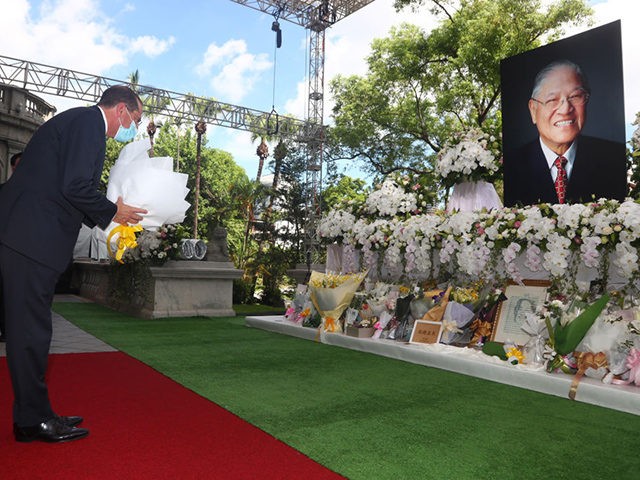On his last day in Taiwan, U.S. Health and Human Services Secretary Alex Azar visited the shrine of former Taiwanese President Lee Teng-hui.
Azar praised Lee, who died at the age of 97 on July 30, for leaving a “democratic legacy” he said will “forever propel the U.S.-Taiwan relationship forward.”
The Chinese Communist Party, which despises Lee as the “godfather of Taiwanese secessionism” and is fuming over Azar’s historic visit to the island, snarled that the HHS secretary “abandoned the millions of people who are struggling with illness and visited Taiwan instead to stage a political show.”
Lee Teng-hui was Taiwan’s first democratically elected president and its first native-born head of state. He was also the last president, to date, from the Kuomintang Party, which founded the Taiwanese state but is currently the more pro-China of the two main Taiwanese parties.
The Chinese government was not happy when Lee brought bold democratic reforms to the presidency after climbing the political ladder as a relatively staid Kuomintang man. Beijing denounced Lee as a political Trojan horse, and on one memorable occasion called him “a deformed test-tube baby cultivated in the political laboratory of hostile anti-China forces.”
Lee held office from 1988 to 2000 after decades of authoritarian rule, most of it conducted under outright martial law. He was a staunch critic of Communist China and firmly insisted on Taiwan’s sovereign status.
As an elder statesman in 2018, he tried to set up a referendum that would have formally changed the name of the government he once led to “Taiwan” instead of “Republic of China,” the name Beijing (barely) tolerates. One of his last political adventures involved helping to establish a new party called the Formosa Alliance whose platform includes declaring independence from China. “Formosa” is a name for Taiwan that China arguably dislikes even more than “Taiwan.”
“China’s goal regarding Taiwan has never changed. That goal is to swallow up Taiwan’s sovereignty, exterminate Taiwanese democracy and achieve ultimate unification,” Lee warned in a 2018 interview with the New York Times.
The American Institute in Taiwan (AIT), the de facto U.S. embassy to the Republic of China, praised Lee as a “reformer, partner, and friend of the United States.”
“President Lee’s success in transforming Taiwan into a beacon of freedom and democracy and in cementing the U.S.-Taiwan friendship will be felt by many future generations,” AIT said.
The South China Morning Post anticipated that the public memorial to Lee constructed in Taipei earlier this month could become a diplomatic flashpoint, especially if a high-ranking U.S. official instead of a “middleweight” visited to pay respects.
That heavyweight visit came to pass on Wednesday, as departing HHS Secretary Alex Azar visited the Lee shrine and praised his accomplishments in much the same terms as AIT.
“President Lee’s democratic legacy will forever propel the U.S.-Taiwan relationship,” Azar wrote in a handwritten note left at the shrine.
After a subsequent visit to a mask factory, Azar said the United States will “continue to support Taiwan as our friend and our partner across security, economic and healthcare issues.”

COMMENTS
Please let us know if you're having issues with commenting.